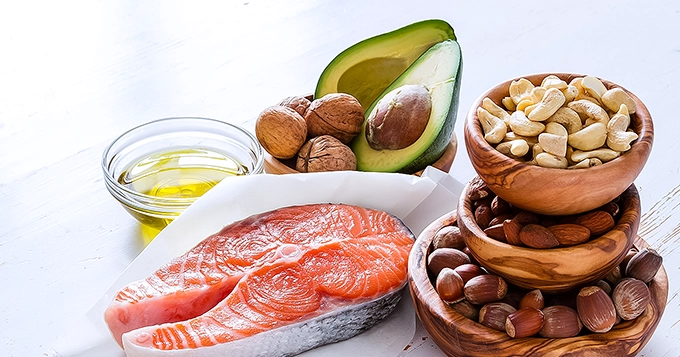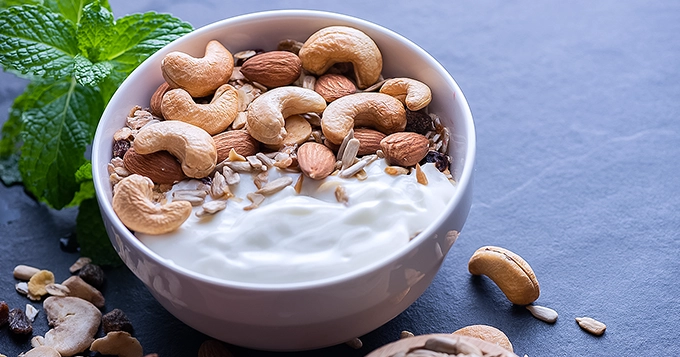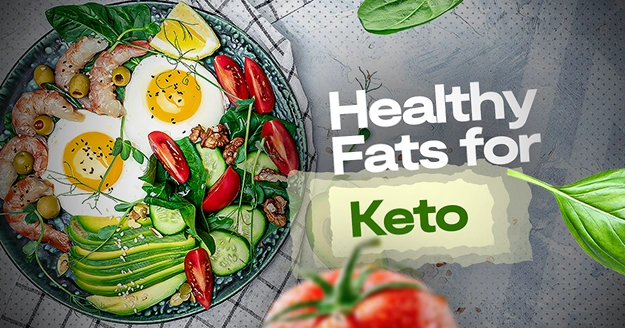The ketogenic diet has gained immense popularity as an approach to weight loss and for its overall health benefits. On this diet, your body enters a metabolic condition known as ketosis when it starts using fat for energy rather than carbs. Central to the success of this low-carbohydrate, high-fat diet is the emphasis on consuming healthy fats for keto.
Let’s explore the vital role that healthy fats play in the keto lifestyle and how they fuel the body and promote ketosis.
Healthy Fats vs Unhealthy Fats
Some types of fat, including saturated and trans fat, can have adverse health effects, especially when consumed in excess. These fats can raise LDL cholesterol, also known as “bad” cholesterol.
Monounsaturated fats and polyunsaturated fats, on the other hand, are the best keto fats. They are considered to be the “good” fats. These healthy fats for keto can also increase HDL cholesterol levels, or “good” cholesterol.
Roles of Healthy Fats in the Keto Diet
1. Energy Source
Healthy fat sources, such as avocados, olive oil, and nuts, are rich in calories and provide a sustained energy source for the body.
One of the principles of the keto diet is the shift from carbs to fats as the primary source of energy.
Because there aren’t enough carbohydrates in the keto diet, your body burns fat instead of carbs for energy. As the body breaks down fat, it produces something called ketones. Your body and brain start using the ketones, known as ketone bodies, as their primary energy source.
2. Ketone Production
The liver uses a process known as ketogenesis to turn fats into ketones when carbohydrates are restricted.
Ketones are an alternate fuel source, particularly for the brain, which typically uses glucose. Good fats help the body produce ketones efficiently, which puts the body in a state of ketosis when it uses fat instead of carbs for energy.
3. Satiety and Appetite Control
According to studies, fats do affect satiety in a controlled environment. They also seem to limit appetite through several methods, such as releasing hormones that control hunger and slowing intestinal transit and gastric emptying among other mechanisms.
Consuming healthy fats helps promote a feeling of fullness and satisfaction, reducing overall calorie intake.
4. Nutrient Absorption
Fat-soluble vitamins such as Vitamins A, D, E, and K are absorbed better by the body when fat is consumed with them.
Including healthy fats in your keto meals ensures that your body can absorb and use these essential nutrients effectively.
5. Cellular Health
From assisting the mitochondria in producing energy to shielding the cell membranes, fatty acids have numerous positive effects on the health of our cells. Fats are essential components of cell membranes and play an essential role in maintaining cell structure and function.
The essential fatty acids that our cells need to function are omega-3 and omega-6. Flaxseeds and fatty fish, such as salmon, are good sources of omega-3 fatty acids, which also have anti-inflammatory qualities and support the health of cell membranes. On the ketogenic diet, prioritizing these good fats promotes cellular health in general.
6. Flavor and Palatability
Fat is frequently linked to the melt-in-your-mouth, creamy, rich, and smooth taste and texture of food. It helps intensify or blend the flavors of various ingredients.
Healthy fats add richness and flavor to keto meals, making the diet more enjoyable and sustainable.
7. Heart Health
Foods high in healthy fats can lower your levels of bad “LDL” cholesterols and increase levels of your good “HDL” cholesterol. This helps minimize the risk of heart disease and stroke and aids in the body’s cellular renewal process.
Sources of Best Fats To Eat On Keto
Avocado
Keto good fats sources include avocados. Avocado is healthy for your heart and may help with osteoarthritis symptoms. They are also a good source of important nutrients including potassium, calcium, magnesium and B vitamins.
Fish
Fatty fish like salmon, mackerel, herring, trout, sardines, and albacore tuna are excellent sources of heart-healthy omega-3 fatty acids. These fats may also support cognitive function as you age. The American Heart Association recommends consuming around two servings of fatty fish every week.
Ground Flaxseed
Incorporating healthful fats into your diet can enhance the appearance of your skin, making it appear more youthful and supple. Ground flaxseed can provide you the fats that can contribute to increased fiber intake and may assist in reducing inflammation.
Beans
Including beans in your diet can benefit your body and mind, whether kidney, Great Northern, navy, or soybeans.
Seeds
Sesame seeds, sunflower seeds, and pumpkin seeds are tiny but quite powerful. Their “good” fats can decrease cholesterol. Plus, plant-based fats are generally healthier than fats derived from animal sources.
Nuts
From hazelnuts to pecans, all nuts contribute positively to heart health.. However, moderation is key. Despite the heart-healthy nature of these fats, it’s vital to avoid overconsumption.
Conclusion
In the ketogenic diet world, healthy fats are essential for success. They give you lasting energy, help with ketosis, control your appetite, help your body absorb nutrients, and keep your cells healthy. To make the most of your keto diet and ensure a well-rounded approach to nourishing your body, include a variety of healthy fats in your meals.
Check food labels to see how much and what kind of fat is in your food. Try to have less saturated fats and avoid trans fats for better health.








